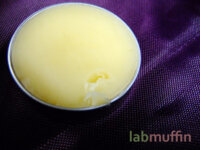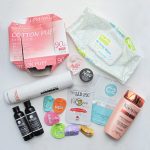There are a lot of things that are supposed to be good for your skin. Today I’m looking at one that is in a lot of anti-ageing products, and has rave reviews on Makeupalley – vitamin C.
Vitamin C (aka L-ascorbic acid) is essential in your diet – it has a lot of roles in the functioning of your body, including production of collagen, as an antioxidant and in your immune system. Luckily, most people these days get more than enough vitamin C in their food. It’s in many fruits and vegetables, as well as liver. However, it’s possible to overdose on it, so be careful!
Collagen is an important part of skin strength and elasticity. Loss of collagen is one of the reasons wrinkles develop. Although collagen production naturally decreases as you get older, some things such as sun exposure (also known as photoageing) and smoking can prematurely lower your collagen.
You might also know that free radicals can also age your skin, and as an antioxidant, vitamin C can help soak these up before they damage you – so there’s more than one reason vitamin C is good for unwrinkling your skin. It’s even been found to be effective at preventing sunburn, if applied before sun exposure.
Related post: Antioxidants in Skincare: What Do They Do?
Additionally, for those who are worried about darkened spots from the sun, topical vitamin C has also been shown to lighten hyperpigmentation. It’s also been shown to help lighten acne scarring and get rid of roughness.
Video: My Routine for Fading Acne Marks (Post-Inflammatory Hyperpigmentation)
A study found that people who didn’t have enough vitamin C in their diet saw the most improvement using topical vitamin C products. However, eating a lot of vitamin C doesn’t really increase the amount of vitamin C that ends up in your skin, because your digestive system gets rid of the excess. The most effective way to get it into your skin (if you have enough vitamin C in your diet) is to slop it on!
But the form of vitamin C that you put on your skin is a complex issue too! The problem with just using straight vitamin C (as it looks in the molecular diagram above) is that it’s quite unstable when you store it exposed to air for too long. Creams often use an inactive form which can be converted to the active form in the skin, such as ascorbyl-6-palmitate and magnesium ascorbyl phosphate (MAP).
Vitamin C-containing creams tend to be quite expensive, so you can just use powdered L-ascorbic acid, or grind up some vitamin C tablets, and use it immediately (and in fact, one study found that results were better when plain vitamin C was used!). However, the low pH means that it can irritate your skin, so be careful and stop if you see irritation. There are many vitamin C serum recipes available online.
Related post: Easy (5 Minute) DIY Vitamin C Serum Recipe
Are you going to start using vitamin C now? Or are you going to wait until you start getting wrinkles?
References
P. K. Farris, Topical vitamin C: a useful agent for treating photoaging and other dermatologic conditions, Dermatol. Surg. 2005, 31, 814-818.
Humbert et al., Topical ascorbic acid on photoaged skin. Clinical, topographical and ultrastructural evaluation: double-blind study vs. placebo, Exp. Dermatol. 2003, 12, 237–244.
Nusgens et. al. Topically Applied Vitamin C Enhances the mRNA Level of Collagens I and III, Their Processing Enzymes and Tissue Inhibitor of Matrix Metalloproteinase 1 in the Human Dermis, J. Invest. Dermatol. 2001, 116, 853-859.








My favourite moisturiser http://www.moogoo.com.au/moisturising-creams/anti-ageing-cream.html contains vitamin C. Glad its effects are real 🙂
Ooh, I walked past a shop selling Moogoo this morning! Very cute packaging and it looks pretty effective!
I’m going to search some recipes now 🙂
The “most helpful” comments on Vitamin C at Makeupalley have a few recipes 🙂
Thanks, I’ll look there 🙂
I was hoping you would say adding vitamin C in your diet would help with improving skin. Guess I have to smother myself in it too:) I’m a lemon freak so I’ve never had issues with getting my vitamin C in 😉
I absolutely love lemons too! Lemon curd is my favourite 😀 It’s unfortunate that it doesn’t target skin that way though!
i take a vitamin c supplement… just because i heard when working out if u take 500mg of vit c you burn 39% more fat and i’m all for working of my fat!! 🙂 also… when i’ve been run down i actually use vitamin c gel as an overnight mask on my face so it doesn’t look as grey! i didn’t know why it worked… just knew it did so i do it! should i do it more often?! also… i know this isn’t primarily a nail blog but ive tagged u in a nail polish question thingy if u want to do it… the details are on my blog 🙂
Ooh, burning off fat sounds good 🙂
I don’t actually use vitamin C on my face yet… I have very oily, plump skin so wrinkles aren’t really as big a problem as pimples and enlarged pores at the moment! I’ve recommended it to other people who have asked me about wrinkles though. I think the products you should use are the ones that address your individual skin problems, so if you like the results from the mask, then I say go for it! 🙂
i love reading your science posts! oooh this is taking me back to cell bio! haha
Yay! 🙂
Argh! I wrote you a long, gushy comment and then accidentally navigated away from the page. Here’s the summary:
1) LOVE your posts. I’m really into the Lab Muffin Guides like this one. The AHA & BHA was great for me because I use lots of them to treat the keratosis pilaris on my cheeks, arms, and legs.
2) I’ve been wondering about vitamin C, so thank you for the explanation! I have slightly dry 23-year-old skin that I want to maintain as much as possible. I love the effects of 15% glycolic acid cream (so glowy!). Retinoids dry my skin a bit too much for now. I love that Vitamin C has both sun protection and anti-aging benefits. I think I’ll try it!
Hi sorry I know this is an old post…
Do you have any idea if someone who has developed an allergy/a bad intolerance to eating artificial vit c (any ingredient that has ascorbate/ascorbyl/ascorbic in), but is fine with eating it naturally via fruit/veg, can use vit c containing products on their skin?! I think I’m an alien.
interesting post! i have a cream that is 2.5% BP and 0.1 adapalene. Carlmont Pharmacy i’m a bit worried that those free radicals may be damaging to the skin?
I’ve been dying to try rosehip oil for some time now. Do you think the Vitamin C in rosehip oil would be stable?
Hi All !
Mario Bade cu is ECCENTRIC!!! This serum is AMAZING. I am actually incomprehensibly happy with it, and am overjoyed by the price point– because I have become accustomed to expenditure so much on serums, and this one is so imaginary, and at a fraction of the price. I will definitely obtaining this when I finish this bottle.
I have not tried the Diehl’s Clearly Counteractive Dark Spot Solution– so sadly I cannot associate them. Have you tried it, and if so- is it magnificent? 🙂 Vitamin C Serum for men
I have acne-prone skin and the Daily Conditioner only aggravated the problem, with large cystic pus-filled acne germination up all over my cheeks. What’s worse is that there is a glazed shimmering look on my face in part due to the sesame seed oil in it. Any indicators on a good sunblock? I’m handing over this produce to my mother. I discovery glycerin makes the serum very adhesive. I currently use the recipe from magnificently green and her recipe only calls for 1 tsp. of glycerin and I can barely stand the adhesiveness from that
topical vitamin c
I always thought that plant oils didn’t contain vitamin c even if their fruit did, because it is water soluble rather than oil soluble.
Yeah I think I may have gotten it wrong with this one – this paper on the content of the CO2 extract is all I’ve managed to find on it and it shows relatively high ascorbic acid (though I can’t work out the units), but also 9% moisture and 88.9% lipids. I think in commercial rose hip oils they separate the moisture out.
I’ve was using skinceuticals vitamin c serum a few years ago and it made my skin look great. Then I read something from a site from a company that said they would never make a vitamin c serum because it’s actually bad for your face. They basically said the vitamin c oxidizes on your skin. I’m itching to go back to using vitamin c but I’ve been hesitant given what I read on that company’s site
If it’s the article I think you’re talking about, I addressed the points here: https://labmuffin.com/mythbusting-vitamin-c-serums-bad/
Hello Michelle! I’ve learnt a lot reading your blog! Regarding vitamin C, I’ve read it online that many vitamin C derivatives, e.g. ascorbyl terraisopalmitate, tetrahexyldecyl ascorbate, sodium ascorbyl phosphate, AA2G, etc., are actually inactive because of their large size or their unprotected hydroxy, making it easily oxidized before application. Is it true? And if that’s the case, how can we tell which derivatives are the effective ones? Thank you very much!